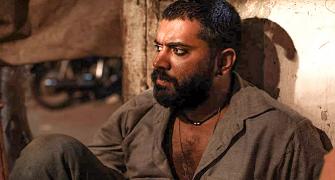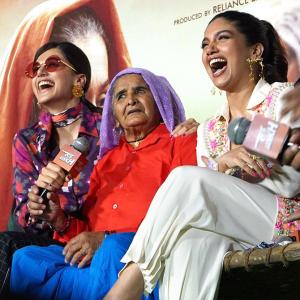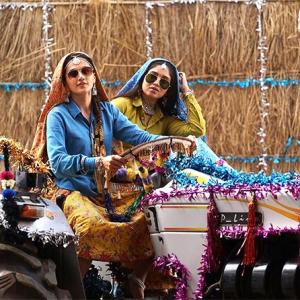'I felt a constant gag in my throat, and emerged from the movie somewhat mugged,' confesses Sreehari Nair.

In Tushar Hiranandani's Saand Ki Aankh, Prakash Jha plays a character the audience can collectively detest.
An oppressor of women, a slapper of children, and a waster of precious hookah -- what's not to hate about good old Tauji?
Tauji's opposite numbers, Chandro and Prakashi Tomar, are all things angelic.
They are sharpshooters, oppressed at home, who sneak into shooting competitions and trade spots 1 and 2 on the podium.
Chandro and Prakashi are based on real people, and a more honest movie would probably be interested in knowing if there ever was any friction between the two ambitious women.
After all, isn't it an acknowledged fact that ambition and unhealthy competitiveness often go together?
But these are angels we are talking about, and any intrusion of human nature can only amount to an impractical screenwriting choice.
So why bother?
Each person in Saand Ki Aankh has been marked out as either on the side of the hateful Tauji or on the side of the lovable Dadis.
If you are okay with such a diminishing of characters' individuality and of their range of meaning, you can relax into the movie.
Like a well-oiled liberal machine, you can embrace its tale of the Oppressed Vs the Oppressor.
As for me, I felt a constant gag in my throat, and emerged from the movie somewhat mugged.
This is the kind of movie in which Taapsee Pannu and Bhumi Pednekar, heavily made up to look like two 60 year olds, walk into a shooting competition and the spectators immediately start jeering them -- behaving as if they had just seen two witches come in, riding on their broomsticks.
The behaviour of the spectators made me mumble to myself, 'Man, I am so much more dignified than these boors.'
This is the basic cunning of Saand Ki Aankh's 2 hour 25 minute narrative -- it massages the ego of the urban, educated, decent type and keeps on showing and saying what such a person wants to see and hear.
Don't you bring up artistic quality and other allied stuff; this is more like a movie for dentists.
It's also the kind of movie that can lure a critic into repeating the language showcased in the film's publicity material -- if we are not careful, it can turn us all into over-earnest PR managers.
Moderators of symposia with titles such as 'Why is Bollywood lagging behind our regional cinema?' would (if they genuinely wish to know the answer) do better to watch Tushar Hiranandani's film than the next Sajid Khan atrocity.
In the best Indian regional films of today, life is captured in all its seemingly useless details, and the stories are allowed to grow out of these little details.
In Saand Ki Aankh, however, the world adjusts to chronicle and intensify the struggle of the Tomar sisters-in-law.
This is the kind of movie where even the wind doesn't blow unless it is to give Vineet Kumar's saviour character a chance to say, 'Look, the winds of change are here.'
Pretty Damn Neat!
If I am sounding too grumpy, let me tell you, the film starts off being fun.
The first half moves along at a very good clip, so much so that we don't get enough time to worry about the underlying emptiness of it all.
The efficiency of Hiranandani's technique, the sureness in his shot-taking, and the resilience of the underdog arc keep us invested.
Chandro and Prakashi Tomar's everyday travails are presented using a happy song, and this makes them come off as smart women who have advanced beyond their puny men's expectations of them.
The domestic scenes have a touch of comic desperation.
The Tomar household has three couples but only one bedroom, and so sex becomes a matter of rigid schedule.
The men are sex-loving no-goods and it's the women who raise the kids and keep the farm running (A passing scene has Taapsee Pannu balancing a set of bricks on her head with the muscle memory of a pro).
Later, when the Emergency is announced and vasectomy looms large, the men scamper about like actors in those classic two-reelers, while the women dole out cheerful condolences: 'Isn't it sad that the government wants to take away from these men the one thing that they are actually good at?'
There is almost a mathematical quality to Hiranandani's cinematic approach, and you can see that in his framing as well as in the way he shapes certain scenes.
A screening of Mother India has Chandro and Prakashi watching Nargis's gun-wielding act from behind their ghoonghats, and that foreshadows their eventual destinies.
In a sequence where I was expecting Vineet Kumar to show up, the camera sprang a surprise by revealing his face in a bike's mirror.
When Prakashi and Chandro tell their husbands fake stories to get away from home, the symmetry in their dialogues is almost perfect.
There's, however, only a small difference between being mathematical and being calculating, and it is this difference that is responsible for the lightness of the first half giving way to the heavy-handedness of the second.
It's when the Dadis make winning a habit and the movie thinks it's time to pipe in social renaissance, that the narration turns jittery, the staging becomes askew, and the editing feels rushed.
Hiranandani's social renaissance comes from a man who filters everything through the now fashionable anti-male attitudes and celebration of the overtly sensitive.
The reason why Manoj Bajpayee's pimp in Love Sonia felt so scary was because the writers of that movie had not denied the character his shrewdness and intelligence.
You got a sense of his history and what drove him to do the cruel things that he did.
The men in Saand Ki Aankh, led by Prakash Jha, are so buffoonish and humdrum, that they don't even feel threatening (Truth be told, Jha is quite a skillful performer and his character's ineptness here is the fault of the writing).
To balance the stuffed coyotes (meaning, the men), Hiranandani and his writer give us a set of swans, and they are more of the same: masterpieces of taxidermy.
I am talking about a royal couple, who meets the Tomar ladies at a shooting competition, and who then invites them to their palace.
At the banquet, when Chandro Tomar drinks from her fingerbowl, the royal lady proceeds to drink from her fingerbowl too.
The whole scene is so steeped in the spirit of a television advertisement that it's as though research didn't help write it, Piyush Pandey did.
In one sense, it is the simple-minded makers of films like Saand Ki Aankh that the protagonists of films such as Newton and Article 15 represent.
These are people who look to rural India and its problems with their liberal eyes, and with a steely determination that says, 'I am going to change things!'
The best parts of Newton and Article 15, for me personally, had to do with the education of these protagonists -- those moments when they finally grasped the fallacies in their own idealism.
Because Saand Ki Aankh isn't self-introspective, like the above mentioned two films were, it is forced to fall back on the now established trope of letting Taapsee Pannu teach a regressive society the correct social values -- all so that a bunch of popcorn souls can clap and feel good about themselves.
By this point, I was pursuing the movie with the only intention of noting the subtle distinctions in Pannu's and Pednekar's approaches to their respective characters.
And the biggest compliment I can pay to Pednekar's performance is that, after a while, her superfluous make-up seemed to stop mattering.
She has a trained actor's polish, and she uses that to give her character, shadings, beyond the allotments of the script.
When she plays pregnant, the exhaustion on her face confirms her condition.
That slight biting of the upper lip, when she cries.
That hint of heavy breathing, when nervous.
When Pednekar's Chandro Tomar walks, you get some semblance of the swellings, the hemorrhoids, and the foot corns that must be troubling the old lady below her waist.
She is theatrical through and through, and yet, there is no affectation you can detect.
Taapsee Pannu lacks the trained actor's polish, but she is a constantly evolving performer.
Compared to Bhumi, Pannu has fewer tricks up her sleeve, and, as always, where she falls short is *behaving convincingly* in situations that go against her character's anticipations.
She has a beatific smile that she puts to good use here -- and yet, I couldn't help wondering what a Rasika Dugal would have made of this part.
We are living in a period of Bollywood when one no longer has to point toward clichés like the widowed mother or the avenging son to demonstrate what constitutes a masala entertainer.
In the present climate, an Indian director delivers the effect of masala by placing at the centre of his story, a burning social issue, and to either side of this social issue a set of hyper-conservative villains and some suffocated figures trying to break out. (This is basic cable as far as Masala Cinema in 2019 is concerned).
If your tolerance for such movies is high, if you think there's a particular sort of joy to be discovered in revisiting stereotypes you have already formed in your head, then dipping into Saand Ki Aankh wouldn't hurt you.
It is a film that believes, and rightly so, that the audience's current, strained relationship to concepts like patriarchy and masculinity will ensure that the gaps in the writing and the making remain overlooked.
Seen this way, Saand Ki Aankh is not too different from the blockbusters that vied for your attention during Diwalis past.
This film is not about Shah Rukh Khan, two heroines, and a romantic conflict, as was the case with Diwali releases in the preceding decade. It is, however, just as sugary, formulaic, and easy to consume.
Sure, the winds of change are here.
And while they may be bringing in the smells of our villages instead of the perfumes on Manish Malhotra's latest collection, our simple-mindedness as viewers is what continues to inspire their creation.











